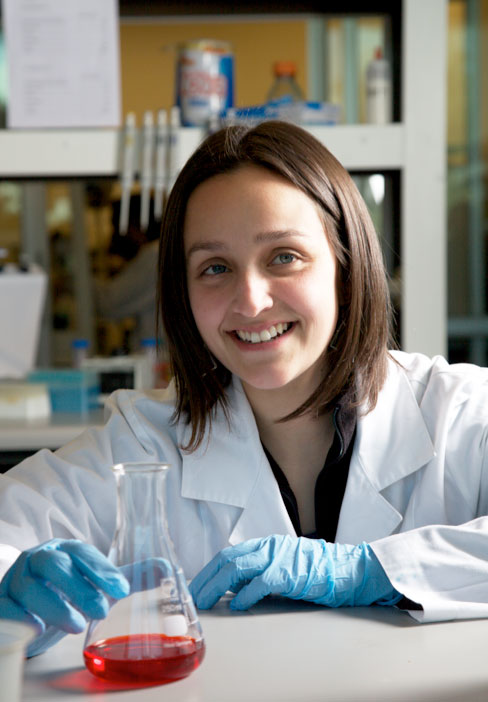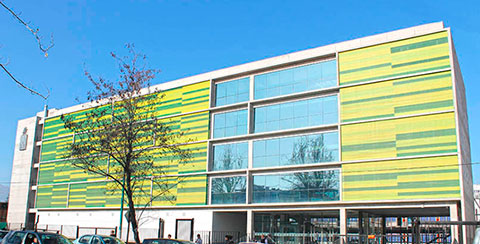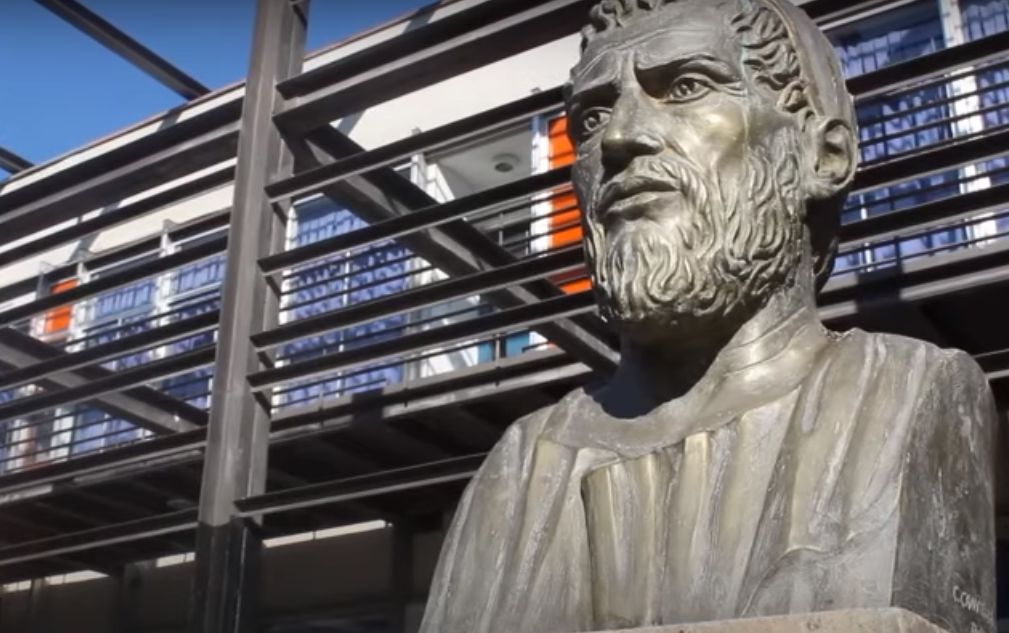The Faculty of Chemical and Pharmaceutical Sciences of the University of Chile is the first and oldest College of its kind in the country. It was founded on July 1, 1945 by Rector Juvenal Hernández.
This unit offers undergraduate majors in Chemistry and Pharmacy, Biochemistry, and Food Chemistry and Engineering. At the graduate level, there are doctorates, masters, diplomas and specialized courses.
 The Faculty is located in the commune of Independencia, Santiago de Chile, on 984 Santos Dumont Street. It is part of the Eloisa Díaz campus at the North Campus of the University of Chile and is staffed by the School of Medicine and the School of Dentistry faculty.
The Faculty is located in the commune of Independencia, Santiago de Chile, on 984 Santos Dumont Street. It is part of the Eloisa Díaz campus at the North Campus of the University of Chile and is staffed by the School of Medicine and the School of Dentistry faculty.
Our Faculty is made up of three buildings: Dr. Luis Núñez, Dr. Luis Ceruti, and Professors Eméritos buildings. It has a Great Hall, lecture building, sports court and green spaces.
The Faculty’s university community is made up of more than one hundred Academics involved in teaching, research, and extension. In addition, it has more than 120 staff members and close to 1,500 undergraduate students and 400 graduate students.
Mission
The mission of the Faculty of Chemical and Pharmaceutical Sciences at the University of Chile is to create, cultivate, integrate, and transmit the teaching of chemistry itself in close connection with Pharmaceutical, Biochemical, and Food Sciences.
The fundamental principle of the College is to provide qualified professionals with solid scientific and ethical education and management ability in the areas of Pharmaceutical, Biochemical, and Food Sciences.
 This mission is brought to life by providing the country with highly qualified professionals who are directly involved in health (Chemistry, Pharmacy and Biochemistry) and in industrial and technological chemical development (Food Chemistry and Engineering).
This mission is brought to life by providing the country with highly qualified professionals who are directly involved in health (Chemistry, Pharmacy and Biochemistry) and in industrial and technological chemical development (Food Chemistry and Engineering).
The education received at the College prepares students to practice their profession and contribute to the country’s development and progress. These professionals are also prepared to participate in continuing education and specialized and/or graduate programs.
The College carries out its mission with excellence and commitment, thoughtfully and critically, through its foundational activities of teaching, research, and extension.
This mission is achieved through the work of its Academics in:
- Undergraduate, graduate, and postgraduate teaching
- Basic and applied research in the areas taught at the College
- Extension and continuous concern for the country’s issues
Vision
To make the College of Chemical and Pharmaceutical Sciences at the University of Chile into an internationally recognized center of excellence, whose Academic endeavors project it as a reference point in terms of its undergraduate and graduate teaching, its research, and its commitment to society and the environment.
Values
- Provide and promote knowledge
- Respect for people
- Profound social and environmental consciousness
Objectives
- Improve the quality of education
- Stimulate innovation and technology transfer
- Improve extension as a link to nationally relevant activities in order to directly contribute to solutions to the country’s problems
Our Faculty was founded on July 1, 1945 under the name Faculty of Chemistry and Pharmacy. However, the seed for the Faculty was planted much earlier. In fact, it goes back to very early times in our country’s history, when the knowledge brought by Spaniards was added to the Mapuches’ knowledge of medicinal herbs.
 The birth of the pharmacy goes back to the beginning of the Conquest with Pedro de Valdivia. The oldest pharmacy in the country was probably that of the Hospital del Socorro and one of the pharmacists was don Diego Cifontes de Medina in 1563.
The birth of the pharmacy goes back to the beginning of the Conquest with Pedro de Valdivia. The oldest pharmacy in the country was probably that of the Hospital del Socorro and one of the pharmacists was don Diego Cifontes de Medina in 1563.
Later, in 1832, a scarlet fever epidemic battered the country and made it clear that high quality pharmaceuticals were needed. This resulted in an important milestone in the history of the Faculty when on February 28, 1833, a decree created the first course called “Pharmacy Class” in the university section of the National Institute, where the government recognized that pharmacy was a useful and necessary science.
In this era, the teaching of chemistry was vital, and the whole first year of studies of the three established by the decree was dedicated to it. This resulted in great advances in systematizing these studies and in contributions by distinguished professors such as Federico Philippi, Ignacio Domeyko, and José Bustillos. This led us to the founding on July 1, 1945, which represented a revolution in the study of chemistry and pharmacy.
Soon, the visionary Academics of that era, aware of the advances in the knowledge of chemistry’s bases, created the Biochemistry degree in 1956. Graduates of that program became accomplished scientists who were mainly dedicated to biomedical research.
The authorities at that time understood that the Faculty had to undertake another challenge, which was to respond to the problems in the chemical industry. To this end, the Chemistry degree was created in 1959. Since then, many generations of chemists have completed their degrees and contributed significantly to the progress of chemistry in the country.
Finally, closing a virtuous circle, the Food Engineering degree was created in 1971, where our graduates play a vital role in transforming our country into an agrifood power.
Deans
- Juan Ibáñez Gómez 1945 -1955
- César Leyton Caravagno 1955 – 1961
- Luis Ceruti Gardeazabal 1962 – 1968
- Mario Caiozzi Marín 1968 – 1975
- Carlos Mercado Schuler 1976 – 1981
- Juan Morales Malva 1981 – 1983
- Camilo Quezada Bouey 1983 – 1986
- Mario Sapag Hagar 1987 – 1990
- Hugo Zunino Venegas 1986 – 1998
- Luis Núñez Vergara 1998 – 2013
- Arturo Squella Serrano 2014 – 2022
- Pablo Richter Duk 2022-2026
National Awards
- Ramón Latorre de la Cruz, National Award in Natural Sciences 2002.
- Pablo Valenzuela Valdés, National Award in Applied and Technological Sciences 2002.
- María Cecilia Hidalgo Tapia, National Award in Natural Sciences 2006.
- Romilio Espejo Torres, National Award in Applied and Technological Sciences 2018.
- Sergio Lavandero González, National Award in Natural Sciences 2022.
Amanda Labarca Award 2017
- Professor Evgenia Spodine
Professors Emeritus
- Irma Pennacchiotti Monti 2002
- Lilia Masson Salaue 2010
- Jorge Valenzuela Pedevila 2017
Our main campus is located at Olivos 1007 (Ex Sergio Livingstone Polhammer), Independencia. The current campus was inaugurated in 1975 and was rebuilt in 1993 after it was damaged in a fire.

This is where all of our multiuse laboratories are developed for use in the Chemistry and Pharmacy, Biochemistry, Food Engineering and Chemistry degrees. Here, you will also find the facilities for the Chemical Development Studies Center (CEPEDEQ, Centro de Estudios para el Desarrollo de la Química) and the Professor Hernán Báez Guerrero Antidoping Analysis and Drug Abuse Laboratory.
There is also a three-tier sector, a sports court, lecture halls and a library.
To arrive at our Faculty, you can enter on Independence Avenue or by subway stations Hospitales (Line 3) or Cerro Blanco (Line 2).
Telephone: +56 2 2978 2810
Legal Framework and Transparency
Laws and Regulations:
Ley Nro. 20.285 de Acceso a la Información Pública
DownloadDecreto Supremo Nro 013/2009
Ministry of General Secretariat of the Presidency, Regulation of Law Nro. 20.285 on Access to Public Information
DownloadDecreto Universitario Nro. 008809/2009
Regulation of Transparency in Management and Access to Public Information at the University of Chile
DownloadDecreto Universitario Nro. 0020630/2011
Establishing the Institutional Information Management Unit
DownloadManual General de Transparencia Activa de la Universidad
DownloadManual General de Transparencia Pasiva de la Universidad de Chile
Download
Transparencia Activa (Active Transparency)
Refers to the proactive dissemination of information by the university, its units, and dependent bodies, affecting third parties’ interests or status (Manual General de Transparencia Activa de la Universidad).
- Includes actions taken by the university, its units, and dependent bodies that impact the interests or status of third parties, distinct from the university itself (Manual General de Transparencia Activa de la Universidad).
Purchases and Acquisitions:
- Details of contracts for the supply of movable goods, provision of services, execution of works, and contracts for studies, advisory, and consultancy related to investment projects, including contractors and major shareholders of providing companies (Manual General de Transparencia Activa de la Universidad).
Other purchases and acquisitions
- Other Transfers:
Public fund transfers, including all financial contributions to legal or natural persons, directly or through competitive procedures, without reciprocal goods and services (Manual General de Transparencia Activa de la Universidad). - Institutional Links: Participation, representation, and intervention of any nature, based on the normative foundation justifying it (Manual General de Transparencia Activa de la Universidad).
For Cooperation Agreements please visit:
INTERNATIONAL
In these annual documents (in Spanish), the activities of the Departments, Centers, and Units that make up the Faculty of Chemical and Pharmaceutical Sciences at the University of Chile are summarized.
Institutional Annual Reports
- Libro virtual Memoria 2022 (pdf)
- Libro virtual Memoria 2021 (pdf)
- Libro virtual Memoria 2020 (pdf)
- Libro virtual Memoria 2019 (pdf)
- Libro virtual Memoria 2018 (pdf)
- Libro virtual Memoria 2017 (pdf)
Annual Management Reports
The Strategic Development Plan is the charter that will guide the strategic development of the faculty for 2022-2031.
General Guidelines by Area of Development: Plan de Desarrollo Estratégico (PDE) 2022- 2031 (PDF, 35532 KB)
The University Decree No. 0023489, July 26, 2022, approves the New Organization and Functioning Regulation for the School of Chemical and Pharmaceutical Sciences at the University of Chile.
Donations
Donation and Sponsorship Management Protocol
This guide aims to describe the main concepts and rules related to the management of resources in the form of donations and sponsorships from external institutions to the Faculty.
Definition and Scope of Donation and Sponsorship Concepts:
Simple Donation
For individuals who do not require certificates
Definition:
A transfer of resources free of charge does not provide any tax benefit for the donor.
How is it made effective?
Through a deposit or transfer, using the following details:
- Legal Entity: University of Chile
- Tax ID: 60.910.000-1
- Bank: Santander
- Account: Checking Account No. 67378156
- Reference: Simple donation without donation certificate.
What proof is provided?
An internal collection receipt.
Are there restrictions on the use of the resources?
As a simple resource transfer, there are no restrictions.
Are there legal prohibitions in the donor-donee relationship?
None.
Donations Affected by the Law
For institutions and companies that require a Donation Certificate for VAT reduction
Definition:
A transfer of resources free of charge (without consideration) that provides a tax benefit for the donor.
How is it made effective?
Through a deposit or transfer, using the following details:
- Legal Entity: University of Chile
- Tax ID: 60.910.000-1
- Bank: Banco de Chile
- Account: Checking Account No. 182-72300-03
- Reference: Indicate donation.
What proof is provided?
A donation certificate.
Are there restrictions on the use of the resources?
In these cases, there are a series of requirements, not only for the donor and donee but also to ensure that the donation is used for the purposes established in the relevant donation law (different laws apply depending on the type of institution receiving donations).
Are there legal prohibitions in the donor-donee relationship?
Article 97 of the Tax Code, Section 24, penalizes direct or indirect consideration or benefit to employees, directors, or their relatives up to the second degree in the year immediately preceding the donation or after that, as long as the donation has not been fully utilized by the donee or simulates a donation.
Sponsorships
Definition:
A provision of resources to finance part or all of an event or specific activity to provide publicity, dissemination, and presence to the sponsoring institution.
How is it made effective?
Through a deposit or transfer, using the following details:
- Legal Entity: University of Chile
- Tax ID: 60.910.000-1
- Bank: Santander
- Account: Checking Account No. 67378156
What proof is provided?
An exempt invoice or an internal collection receipt.
Are there restrictions on the use of the resources?
Ideally, the funds should be used for the sponsored activity.
Are there legal prohibitions in the sponsor-sponsored relationship?
None.
Internal Faculty Procedure
Donations or sponsorships can be made to the Director of Economic and Administrative Affairs by email at sfuenzalida@ciq.uchile.cl so this unit can monitor and verify the effective receipt of resources.
This also applies when an individual or company wants to know where to make donations.
You can find the complete FaCiQyF logos package at the following link. Using FaCiQyF logos implies that they must not be altered in any way, such as resizing, changing colors or composition, or adding text around the logo.

If you would like more details, you can refer to the faculty’s graphic standards manual. Any questions regarding its use can be sent via email to extension@ciq.uchile.cl.
Files
- Complete FaCiQyF Logos Package
- Original Digital Logo (AI) (AI, 1925 KB)
- Green Vertical Logo (PNG, 243 KB)
- Green Horizontal Logo (PNG, 161 KB)
- FaCiQyF Graphic Standards Manual (PDF, 3636 KB)
